The sea was calm, only a silent figure remained, diligently cleaning the sand, picking up each piece of trash washed ashore by the waves. His name was Than - black, thin, but gentle like water after a storm.
No one knew who Than’s biological parents were. People only vaguely remembered that a pretty woman had carried the baby to the fishing port and then quietly left. That night, a storm arose. Mr. and Mrs. Sau, fishermen who had been drifting on the waves all year round, saw the baby curled up next to the net and felt so sorry for him that they took him home to raise. Mr. Sau’s family lived in a cramped house but still shared a bowl of rice with a child who was not related by blood.
When Mr. Sau took the boy out of the net, he saw a piece of paper with the boy's name Than and date of birth written on it... Than had been mute since he was little, only listening, not speaking. Every time someone called his name, he just smiled gently, his eyes sparkling like the morning water.
In the early years, Mr. Sau's family's life revolved around fishing boats and the sea. In the morning, they went out to sea, and in the afternoon, their meals consisted of only white rice with mackerel and grilled herring dipped in fish sauce. But it was fun. Than sat among his siblings, picking up fish for them, smiling with his mouth pursed, joy sparkling in his mute eyes.
When Than was 20 years old, a big storm hit. The Phu Dong sea that day was very rough, the roofs of houses were blown off, and the boats drifted far away. Mr. and Mrs. Sau set sail early, saying "to catch more fish and then return", but in the evening the wind became so thick that no one could see their boat anymore. In the morning, people only found a piece of wood with the words "Sau Hanh" engraved on it.
The newly built tin house was not yet dry. Than sat on the porch, hugging his knees, looking at the distant sea, his eyes were dry but his heart was burning. That night, the villagers heard the wind whistling through the tin roof, as if the cry was swallowed by the wind. No one heard the mute man's cry, but the next morning, the sand in front of his house was soaked.
Rushing to the beach, he drew a heart on the sand. Then the waves washed it away. He continued drawing until he had heard the waves hitting the shore dozens of times. He kept moving towards the sea, the waves hitting his face painfully. Still no sign of his parents' boat.
After his adoptive parents passed away, Mr. and Mrs. Sau's children were divided to live with their grandparents, leaving Than alone. He stayed in the old corrugated iron house and did all kinds of jobs around the beach to survive. When a pub needed a dishwasher, he went. When a boat needed a net, he followed. In his free time, when no one hired him, he carried a sack on his shoulder and walked around the beach, and in a moment the beach was as smooth as glass. Especially during rough seas, he spent the whole day by the beach.
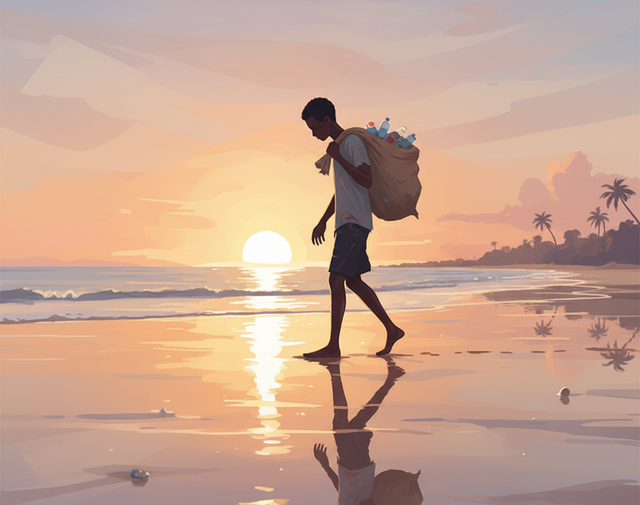
ILLUSTRATION: AI
Many times, he would pick up plastic sugarcane juice boxes from the young kids, who would finish drinking and throw them away with some paper boxes of potato chips and fried sausages. They would shout to each other:
- Come on guys, just leave it there.
Then they rushed across the sand, dust flying everywhere, leaving behind the figure of a young man with a heavy bag of garbage on his shoulder.
***
Once, the neighborhood youth group made a project to pour concrete into the whirlpool, to reduce the water level so that children and the elderly would not be in danger when bathing. Everyone said, "It's so hard, why would anyone do it?" Only Than was enthusiastic. He carried bags of cement, scooped sand, mixed rocks, waded all the way to the water's edge, and soaked himself all day. No one paid him, but he still did it, only occasionally smiling and waving his hand to signal, "The sea is clean and beautiful."
- Mr. Than is quiet but he does a good job!
The young man's voice in the group rang out loudly, but he just smiled.
After the concrete breakwater project was finished, the neighborhood brothers took a picture together to post on Facebook, but they couldn’t find Than anywhere. He was usually quiet like that.
The villagers were kind and gave everyone who had rice or fish to eat. He ate little, usually leaving some for the stray dogs around the beach. The children ran to the beach and saw him, shouting:
- Uncle Than, let us help pick it up!
He just smiled, rubbed his head, then signaled to pick it up carefully, not to leave anything behind.
Thanks to him, the beach gradually became clean, the sand was white, and small fish came back in large numbers. Street vendors praised: "Without Mr. Than, our beach would be very dirty."
One morning after a big storm, Than discovered a plastic bag half buried in sand. Inside the bag was a small bronze bell with faint writing engraved on it:
"For my son".
Next to it was a crumpled piece of paper, only the first few letters of his mother’s name could be read, the rest was washed away by the water. He held the bell tremblingly and pressed it to his chest. The bell rang softly, ringing long in the sea breeze. He hung it on a banyan tree branch in front of the house. From then on, every time the wind blew, the bell rang out, sounding like someone calling from far away.
Then one morning, people could no longer see Than. On the sand, only his old sandals lay right at the edge of the receding waves. Some said he was swept away when he went out to clean up trash after the storm, others said he followed a group of workers to cut sugarcane in the Song Hinh area. But the beach was still as clean as new, and trash never piled up again. People whispered to each other: "Uncle Than must still be around here somewhere, cleaning the beach without stopping."
Since Uncle Than went missing, the villagers stopped throwing trash into the sea. Every morning, the children would take bags and pick up trash, whispering as they did so: "So Uncle Than won't be sad, okay?"
A few months later, a group of tourists from far away came to swim in the sea. Among the group was a woman with silver hair, holding a small copper bell in her hand. She stood for a long time at the edge of the waves, looking far away to the horizon, where the water and sky merged into one.
She asked softly, her voice trembling:
- Here... is there anyone named Than, a mute, skinny guy, I heard he cleans up trash on this beach?
The villagers looked at each other, then someone pointed to the banyan tree, where fallen yellow leaves covered the sand:
- Yes... but he's been gone for a long time. During the storm last year, he went to the beach to clean up trash and hasn't come back.
The woman clenched the bell in her hand, her lips pressed together, her eyes wet:
- When I first gave birth to my baby... I named him Than, because his skin was as black as coal, but very warm... I... accidentally left him at the fishing port...
The wind from the sea blew in, making the bell in her hand ring out a tiny sound, as if it were calling from far away. The waves also gently lapped on the shore, as if in response.
The villagers were silent, all bowing their heads. The sand blew lightly, covering her footprints, covering the beach where Than used to clean up people's trash every day.
Since then, every morning, people see a small bell hanging on a banyan tree branch, ringing every time the wind blows. The Phu Dong beach - after many stormy seasons - is still clean, as if someone is silently cleaning it, never stopping. The waves still go and come, the sand is still soft under the feet of passersby. Only kindness remains, like a grain of salt in the sea, melting but never disappearing.

Source: https://thanhnien.vn/nguoi-giu-bien-truyen-ngan-du-thi-cua-nguyen-thi-ngoc-diem-185251026221908273.htm


![[Photo] Prime Minister Pham Minh Chinh chaired a meeting to discuss solutions to overcome the consequences of floods in the central provinces.](https://vphoto.vietnam.vn/thumb/1200x675/vietnam/resource/IMAGE/2025/10/29/1761716305524_dsc-7735-jpg.webp)
![[Photo] Prime Minister Pham Minh Chinh chaired a meeting to evaluate the operation of the two-level local government model.](https://vphoto.vietnam.vn/thumb/1200x675/vietnam/resource/IMAGE/2025/10/29/1761751710674_dsc-7999-jpg.webp)

![[Photo] Human love in the flood in Hue](https://vphoto.vietnam.vn/thumb/1200x675/vietnam/resource/IMAGE/2025/10/29/1761740905727_4125427122470875256-2-jpg.webp)
![[Photo] Hue: Inside the kitchen that donates thousands of meals a day to people in flooded areas](https://vphoto.vietnam.vn/thumb/1200x675/vietnam/resource/IMAGE/2025/10/29/1761738508516_bepcomhue-jpg.webp)

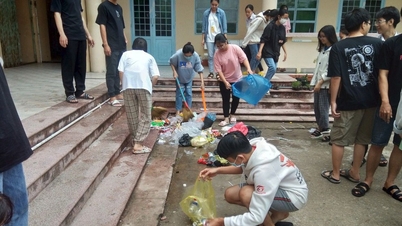



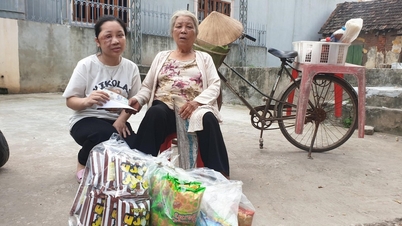


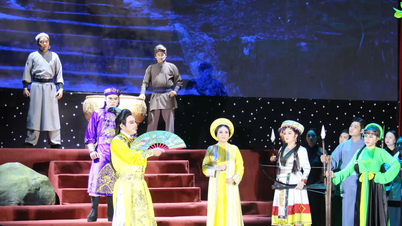































































![[Live] Concert Ha Long 2025: "Heritage Spirit - Brightening the Future"](https://vphoto.vietnam.vn/thumb/402x226/vietnam/resource/IMAGE/2025/10/29/1761743605124_g-anh-sang-am-thanh-hoanh-trang-cua-chuong-trinh-mang-den-trai-nghiem-dang-nho-cho-du-khach-22450328-17617424836781829598445-93-0-733-1024-crop-1761742492749383512980.jpeg)








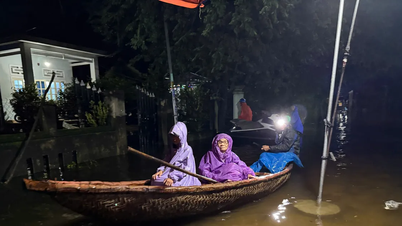





















Comment (0)